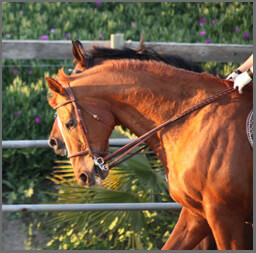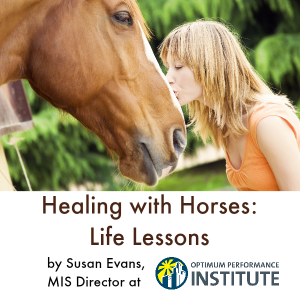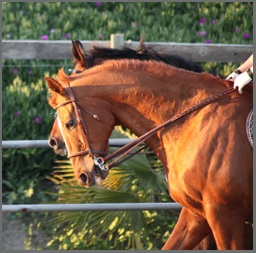
Healing with Horses: Life Lessons
 Ask most people to give you a word to describe horses, and you’ll usually hear “powerful,” “majestic,” “magical,” or “amazing.” I’ve spent my entire life living and working with horses, and the first word I think of is “teacher.”
Ask most people to give you a word to describe horses, and you’ll usually hear “powerful,” “majestic,” “magical,” or “amazing.” I’ve spent my entire life living and working with horses, and the first word I think of is “teacher.”
I first started riding horses when I was six, got my first horse at nine, and have been horse-crazy for as long as I can remember. Horse people joke that they have the horse gene, as true horse people are absolutely fanatical in their devotion. Their approach to horses may be different (trail-riding, jumping, driving, and dressage being among the many things people do with their horses), but they all feel the same way at heart: horses are their passion.
Over the course of time, I have found that if you want to be around horses who want to be around you, be prepared to re-evaluate and adjust just about every aspect of your life. To wit, the following:
A Horse’s Timetable
Horses have shown me that they have their own timetables. If you try too many shortcuts, or rush through your work with them, you will have problems at the other end. Do it right, even if it takes a little (or a lot) of extra time. Life Lesson #1.
The Language of Horses
Horses don’t speak English. If you want your horse to understand you, you have to be creative. Horses are as individual as people, and if you can’t get something across one way, you try another way, and another, until your horse really understands what you want. These are basic communication skills. Life Lesson #2.
Horses don’t speak English, part deux. If you want to understand what your horse is trying to tell you, pay attention. Watch their body language and facial expressions. They can be extremely subtle, very broad, or anywhere in between. Watch and learn, and then watch and learn some more. Repeat ad nauseum. Life Lesson #3.
Praise goes a long way. Tell your horse when he does it right, even if it’s just a good attempt in the right direction. He won’t know if you don’t tell him. Life Lesson #4.
Gaining a Horse’s Trust
Horses only trust you if they know you are not a threat to them. Horses evolved as prey animals, so they are always aware of what is going on around them. They are ready to “exit stage left” at a moment’s notice if they believe they are in danger. When you spend the time to develop a relationship with them, and are consistent, kind, and firm, horses will become more and more relaxed, and be willing to give you the benefit of the doubt. You must invest the time to have a good relationship. Life Lesson #5.
Horses, like people, have individual personalities
Find out what your horse really wants to do. Like people, every horse is different, and not every horse wants to do the job he is “supposed” to do. Horses are often bred to do specific jobs, like jumping, dressage, reining, or cutting. Each type of job has an ideal body type to make that job easier for the horse to do. However, I have known many, many horses who have no idea they should be doing “Job A” (even if they were specifically bred for that purpose), when they really want to do “Job B”. (It’s like telling a 5’8” sports nut kid that he shouldn’t bother with basketball because his whole family have always been accountants.) Stop fighting with your horse and listen to what he’s telling you. Everyone will be much happier at the end of the day. Life Lesson #6.
You create a partnership with a horse
Which brings us to the next observation: when the match is wrong, move on. Owning a horse is not like owning a cat or a dog. Most people will keep their household pets forever, but horses are routinely bought and sold. Very few horses are owned by one person for their entire lives. If you really want to do dressage, and you find that your horse really wants to jump, do your best to find him the right situation, and sell him. Then go find another horse that really wants to do dressage, and buy him. The right partnership, with a common goal, is a whole lot more fulfilling, a great learning experience, and much more fun. Life Lesson #7.
These are just a few of the things I’ve learned by spending my life with horses, and the education never stops. I feel that horses have made me a better teacher, a better student, and a better person overall. And I always have great stories to amaze and amuse anyone who wants to know more about the “magical world of horses.”
By Susan Evans,
MIS Director at OPI
Optimum Performance Institute offers participants opportunities to work directly with horses as part of their treatment program, if they are interested. Participants may volunteer to work with and care for horses and may opt to participate in our upcoming equine-assisted psychotherapy (DBT) skills class. For more information on OPI residential and IOP Day Treatment programs, call us now at (888) 814-5985 or click HERE to submit an online form. We’ll be in touch promptly.

